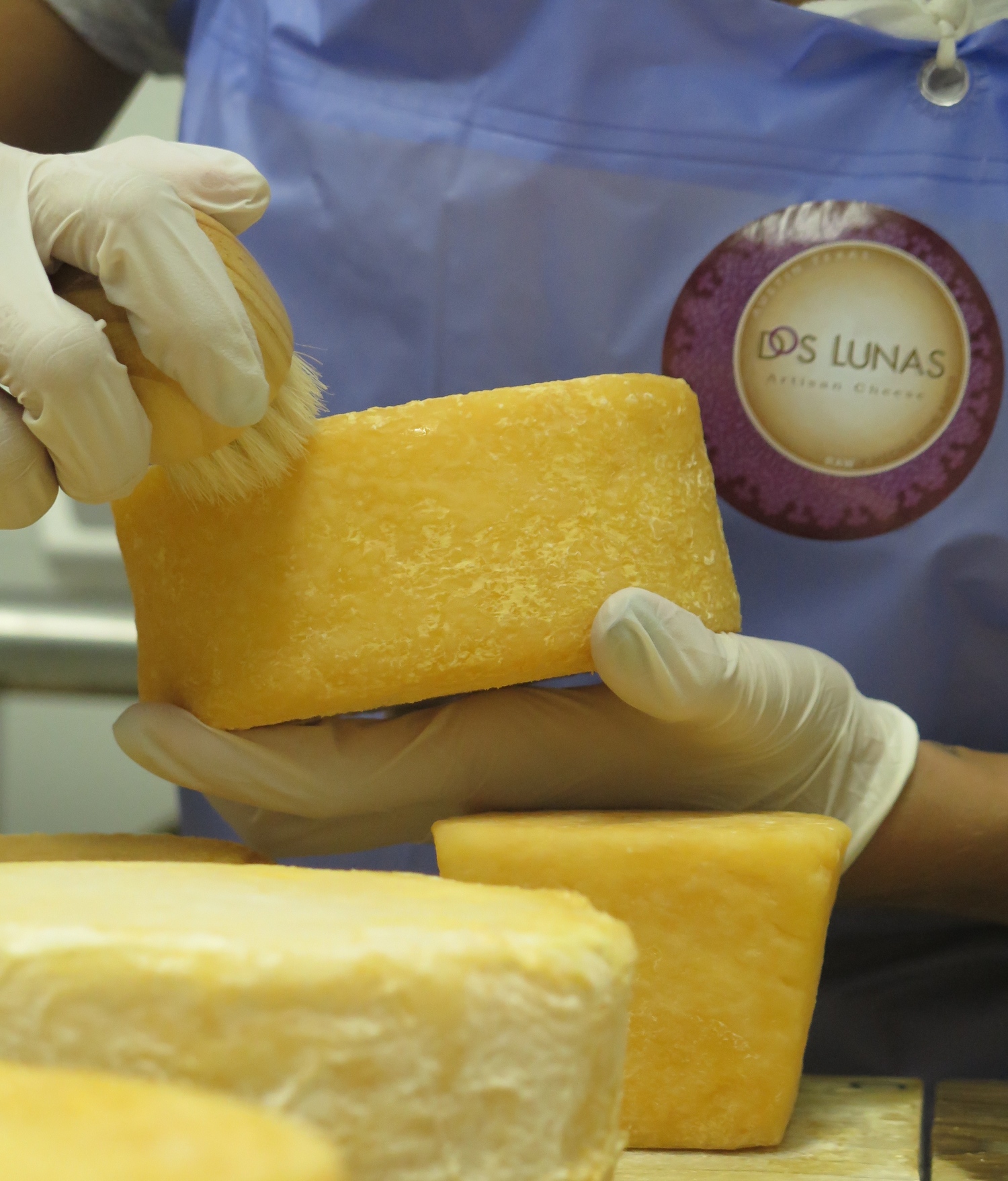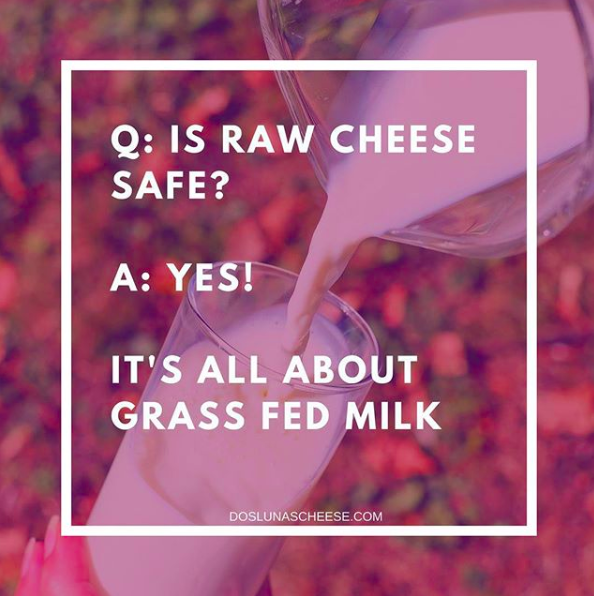WITHIN REACH BY BESE
Electra Avellan
We had the honor to be featured by Zoe Saldana's network BESE. Click here to direct you to the video in their Facebook Page.
If you're not able to submit an email from this page, please contact us directly at
DosLunasCheese@gmail.com
Thank you!
Austin TX 78652
5129635357
Dos Lunas is a specially aged raw cow’s milk cheese, vegetarian from vegetable rennet and Non GMO. Our milk comes from grass-fed, free-roaming cows in Schulenburg, Texas.
Want to know what we are up to?
We had the honor to be featured by Zoe Saldana's network BESE. Click here to direct you to the video in their Facebook Page.






Food and Drug Administration, or FDA, disapproves the use of raw milk and its products due to the risk of serious infectious diseases, its proponents can vouch for its health benefits. It may be best to consult a doctor before eating raw milk cheese, especially if you are vulnerable to infections due to your age, pregnancy or other conditions.
U.S. News & World Report reported in March 2009 that consumption of raw milk and cheese made from it may significantly lower the symptoms of allergic reactions such as asthma, hay fever and eczema. Another study published in the May 2007 edition of the journal “Clinical and Experimental Allergy” also states that children consuming raw milk have a reduced risk of asthma and hay fever. However, the researchers do not recommend raw milk products to prevent allergies due to the high risk of infections.
Raw milk and its cheese also contain some healthy bacteria which colonize the digestive tract and compete with undesirable pathogens for nutrients. This prevents the growth of the pathogens and reduces the risk of certain infections, according to the Department of Environmental Studies at Macalester College, St. Paul, Minnesota. However, individuals with reduced immunity may become susceptible to bacteria in raw milk and its cheese.

The enzymes in raw milk help in the digestion of the sugars, fats and minerals in the milk, according to a research report published in the July 2008 edition of the journal “Appetite.” Pasteurization destroys these enzymes and makes it difficult to digest milk, thereby leading to lactose intolerance which can lead to abdominal bloating, diarrhea and cramps.
The Sunday Times of London, England, reported in 2007 that raw milk contains 10 percent more B vitamins and 25 percent more vitamin C. The heat used during pasteurization may destroy these nutrients along with the flavor and color of the real milk.

BY SHAMALA PULUGURTHA FOR LIVESTRONG.COM

WASHINGTON, D.C. — November 30, 2015 – The Weston A. Price Foundation (WAPF) has filed comments urging the U.S. Food and Drug Administration (FDA) not to place unnecessary burdens on producers of raw milk cheeses.
Raw milk cheeses, made from milk that has not been pasteurized, have been consumed for millennia and are prized worldwide for their rich, unique flavors. For example, under European law, the famous Parmigiano Reggiano can only bear that name if it is produced from raw milk.
In August, the FDA issued a notice inviting public comments on the topic of “potential intervention measures to reduce the risk of foodborne illness” from raw milk cheeses.
“Unfortunately, the FDA is starting with an incorrect assumption, namely that more regulations would benefit consumers of raw milk cheeses,” stated Sally Fallon Morell, president of the Weston A. Price Foundation and a cheesemaker herself. “But the government’s own data shows that there have been very, very few outbreaks from raw milk cheeses produced under the current regulations. Imposing additional testing or lengthening the aging period would simply drive many artisan producers out of business and reduce consumer choices.”
As set out in WAPF’s comments to FDA, most of the outbreaks attributed to raw milk cheeses have actually come from fresh (un-aged) cheeses, which are illegal to sell in this country. New regulatory requirements would be futile in addressing the risks from fresh cheeses.

The WAPF comments include an extensive review of the scientific literature on raw milk cheeses, including comparisons between the safety of raw milk cheeses and pasteurized milk cheeses.
“Cheese in general is a relatively low-risk product, and the majority of the foodborne illness outbreaks that do occur are caused by post-process contamination,” explained Ms. Fallon Morell. “The scientific studies show that the diverse community of microorganisms in raw milk cheese effectively limits the growth of pathogenic organisms, and thus post-process contamination is actually a greater risk in cheeses made from pasteurized milk.”
“All cheese makers should take reasonable measures to address food safety,” concluded Ms. Fallon Morell. “American raw milk cheese makers already comply with extensive regulations in order to produce this product, which thousands of consumers want. The science and CDC data are consistent with millennia of human experience: aged raw milk cheese is a safe, delicious, nutrient-dense food.”

SOURCES:
WAPF’s full comments are available on the Federal Register website at [Federal Register]
About The Weston A. Price Foundation
The Weston A. Price Foundation is a 501(c)(3) nutrition education foundation with the mission of disseminating accurate, science-based information on diet and health. Named after nutrition pioneer Weston A. Price, DDS, author of Nutrition and Physical Degeneration, the Washington, DC-based Foundation publishes a quarterly journal for its 15,000 members, supports 600 local chapters worldwide and hosts a yearly international conference. The Foundation phone number is (202) 363-4394, www.westonaprice.org, info@westonaprice.org.




We are now contributing to a wonderful cause thanks to Dominican Joe and Makarios you can now buy a cheese stick and help provide education to kids in the Dominican Republic.



Pick up your copy now at our Dos Lunas Tents at the SFC Downtown, Cedar Park, Mueller Park and Domain Mall Farmer's Markets every weekend!
OMG! Dos Lunas ONLINE SALE NOW!
Read More
Since January 20 is National Cheese Lover's Day, you may find yourself thinking about cheese more than usual. More specifically, you may find yourself thinking about how much cheese you consume on a daily basis.
Are you feeling guilty? Don't be! Cheese is a beautiful and wonderful thing that does nothing but make this world a better place. Want proof? Here are 11 facts that prove cheese is only capable of proving happiness in this dark, cruel world.
1. It makes you feel better about making mistakes, since cheese was probably invented by accident.

According to the International Dairy Foods Association, the origins of cheese date back to more than 4,000 years ago. Legend has it that an Arabian merchant was traveling across the desert with milk inside of a pouch made from a sheep's stomach. The heat mixed with the pouch lining's rennet caused the milk to develop into curds and whey. The merchant drank the whey and dared eat the curd, which he loved. Obviously.
2. Because you're not alone... at least when it comes to macaroni and cheese.

According to the American Cheese Society, "in any given twelve-week period, approximately one-third of the population of the United States will eat macaroni and cheese at least once." That's either disturbing or comforting, depending on how much cheese you eat.
3. And at one point in time, macaroni and cheese was one of Oprah’s “Favorite Things."'

That's right. Among the cashmere sweaters and expensive jewelry, Oprah named Beecher's "World's Best" Mac 'N' Cheese as one her "Ultimate Favorite Things" in 2010. "The best part [is] it comes frozen," Oprah said. "All you have to do is heat it up, and you've got yourself some good eatin' from Beecher's."
4. Because the good folks have created the ultimate wine and cheese pairing device for you.

You might as well use it. The Wisconsin Milk Marketing Board created the "Cheese Cupid Pairing Tool," in which you can pick whatever wine you're drinking and it will tell you the best cheeses to eat with it. There's even an app you can download.
5. Did you know that in Wisconsin, a county in the state once saved a lot of money by pouring cheese brines on icy roads.

Some years ago, a highway employee named Emil Norby of Polk County thought of a great way to save money on salting all the icy roads during Wisconsin's brutal winters: by using cheese brines leftover from the dairies. Guess what? It worked, and Norby ended up saving the county around $40,000 in rock salt costs that year.
6. Because sometimes all it takes to bring a pasta from good to great is a sprinkling of Parmesan on top of it.

Life tip: Never say no when a waiter asks, "Would you like some cheese sprinkled on top of that?"
7. Ricky Gervais might be more into cheese than you are.

He once told Bon Appétit:
"I’ve probably had -- let’s see -- two different types of cheese today. I had a little mid-morning snack of cheddar on toast and then a little cheese snack later on. I mean, the amount of exercise I need to do to stay a healthy weight is incredible. If I just cut out the food, I’d have a six-pack. I’d look like Matthew McConaughey. The only reason I work out is to live longer so I can eat more cheese and drink more wine."
Respect.
8. Because there's quite the cheese selection for those who keep kosher.

New York City's Brent Delman, who is also known as the "Cheese Guy," has a line of about 30 certified kosher cheeses that he sells in the New York area. According to the New York Times, Delman was able to create the cheeses by convincing cheesemakers in the U.S., Italy and Argentina to separate part of their production so that rabbis could observe the process to make sure nothing unkosher, like animal rennet, slipped into the mix.
9. And if you’re a vegetarian, you can eat any our Dos Lunas Cheeses... made out of 100% vegetable rennet!

All vegetarians know that they need to obtain vitamin B-12 from sources other than meat. And one of those sources is Swiss cheese! SF Healthy Eating reports that out of 12 types of cheese, Swiss has the most vitamin B-12. A one-ounce serving contains 0.95 micrograms, which is 39 percent of the recommended daily intake.
10. Because you can always turn your addiction into a job.

We have!
Yes, there are jobs that require you to eat cheese all day long. In 2014, The New York Times interviewed a man who has one of the best jobs in the entire world. Craig Gile is a cheese grader at the Cabot Creamery Cooperative in Vermont. His job consists of checking to see how the "cheeses are maturing to discern when they are at the peak of the aging process, and at their optimum flavor."
11. And, finally, because all the best party foods include cheese.

get your party on! Order now!
By Renee Jacques for The Huffington Post - Edited by us!

